One Blue Dot was created as a set of tools to upskill and empower dietitians to understand and explain the evidence around environmentally sustainable diets. We've been so impressed by how many of our members have taken the ideas behind OBD and used it to inform their practice or promote sustainable eating in their work.
One Blue Dot Champions is a way of recognising this good work and sharing some of the excellent resources and ideas that have been influenced by OBD and created by our members. All the content below is designed to be used by or inspire others, but please give credit where it is due.
If you have developed something that you'd like to share here, let us know!
Nose to Tail Eating - Emily Cooper
"Having grown up in a rural farming community, I have experienced the barriers faced when considering a meat free diet.
The concept of nose-to-tail eating looks at not only reducing wastage from the meat industry but encouraging consumption of lean, nutrient rich cuts of offal in place of high fat and processed meats.
By targeting this message at meat eaters, it can provide them with ways to make their diet healthier and more sustainable without changing their lifestyle and cultures."
#MeatFreeMonday - Hollie Burrow
Communication message - #MeatFreeMonday
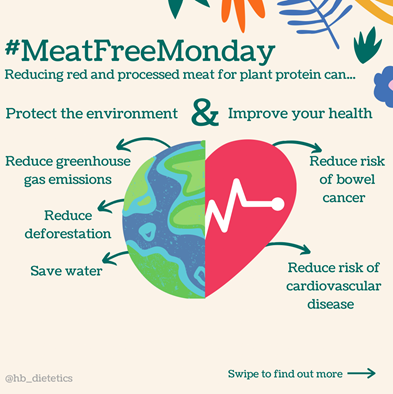
Target audience - Plymouth University students
Digital delivery - Infographic shared on Instagram
"In terms of an environmentally sustainable diet, many evaluations, including the Food and Agriculture Organisation, point towards a diet that contains more plant proteins, and less meat, in particular red meat.
However, a vegetarian or vegan diet is not suitable for everyone. Therefore, #MeatFreeMonday provides a brilliant opportunity to transition to environmentally sustainable eating as the focus is on moderation rather than avoidance of meat. Although, young people are not the highest consumers of meat, there is evidence to show that when young people leave home for the first time to go to university, diet can become compromised.
On this basis, my message aimed to encourage university students to adopt a healthier diet that is also beneficial for the planet. I used infographics to educate students on the benefits of reducing meat intake and sources of plant-based protein. I also included a simple meat free recipe to demonstrate how this information could be applied. As cost remains one of the strongest influencing factors that governs dietary choices, I felt it was important to include a cost comparison against a beef Bolognese to demonstrate that meat free meals can be achieved on a student budget."
Sustainable Food ABC - GCU Students
A desire to explain how individuals can take action on sustainability has prompted a collaborative project at Glasgow Caledonian University (GCU), led by a group of Dietetic students, which aims to raise awareness of sustainable diets and food waste. The project is titled ‘Sustainable Food ABC’ and brings together three elements; Awareness through an online Facebook campaign (which you can find here), Be present at a food demonstration event and a student Cookbook as a proposed output.
With a desire to be evidence-based, the project looked to the One Blue Dot toolkit and additionally highlighted information sources including ‘Love Food Hate Waste’ from the Waste & Resources Action Programme (WRAP) and the Food Climate Research Network (FCRN) education resource from Oxford University. The bright graphics and simple yet powerful messages within the OBD toolkit are ideal for high impact posts and inclusion in the cookbook as a quick reference guide.
In February 2021 the team published the final part of their project, a fantastic and detailed Sustainable Food Cookbook focused on healthy and sustainable recipes. The team used their prize moneu from the BDA Sustainable Hacks competition supported by Alpro to secure editorial and mentoring support from Louise Symington RD. The finished ebook is a fantastic resource, with 120 pages of tips, advice and 40 seasonal recipes. You can access it for free here.
Read more about Sustainable ABC in this blog from Feb 2020.
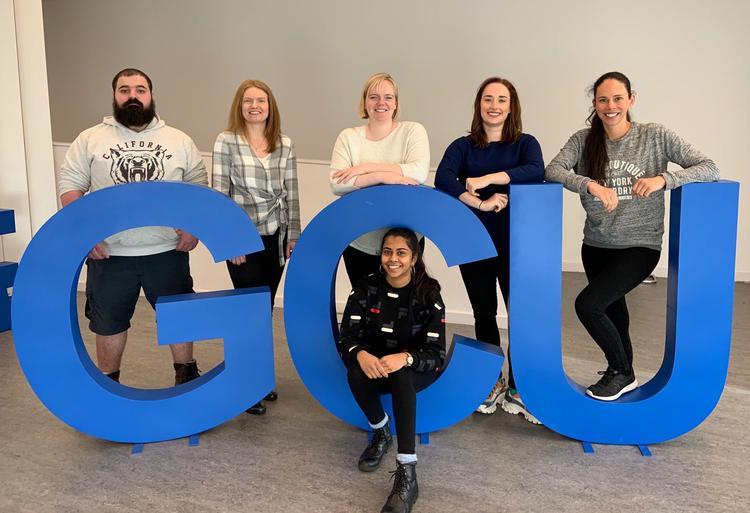
Reducing food waste - Rosanna Strickland
Rosanna Strickland created this video while a student at Plymouth University. Inspired by the issue of food waste highlighted as part of the One Blue Dot programme, the video is designed of highlight the impact food waste has on the environment and what can be done to reduce it.
Rosanna says of the video "Upon learning the impact food waste has upon our emissions in the UK and discovering the shocking statistics available from One Blue Dot and WRAP, I wanted to get the message out. I felt that due to the many ways we can act to minimise food wastage, without negatively impacting our lifestyles, improving awareness could help to make a big difference to improve our environmental sustainability."
Follow Rosanna on Instagram: @do_it_dietetic
#MeatFreeMonday - Olivia Mason
Dietitian Olivia Mason used one of her projects while studying at Plymouth University to develop infographics and recipes drawing on OBD and the #MeatFreeMonday campaign for use on social media. Her aim was to inspire runners to reduce their meat intake in a healthy way.
Olivia said of the project; "Research on Google trends demonstrated that meat free diets have been of interest to a range of athletes recently. I used the #MeatFreeMonday campaign to inspire runners to reduce their overall meat intake to benefit the environment and their health and to show that they can still make a high-protein post run meal with other micronutrients of interest to aid recovery. The focus was on reduction and not complete removal from the diet. I used a mixture of infographics and videos, with the infographics educating on the reasons and evidence why to reduce meat intake and the video to show how (an easy step-by-step recipe!)"
Click on the images to see Olivia's Instagram graphics
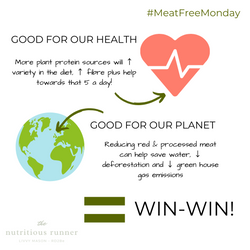
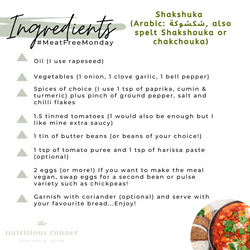
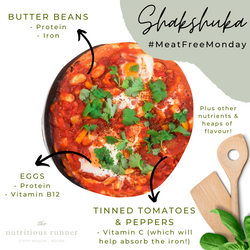
Find Olivia on Twitter: @LivvyMason and Instagram: @thenutritiousrunner
Food waste at home - Natalie Thomas
Student Dietitian Natalie Thomas created this material as part of a project at Plymouth University. Natalie chose to focus on food waste, and produced infographics and a fun video, drawing on evidence from One Blue Dot and WRAP.
Natalie says "I am passionate about reducing food waste and think this is an area not really considered in the dietetic field. Having spoken with my family I discovered families can produce a lot of waste and therefore decided to aim the video towards families with children aged 0-11. The family also reported that planning meals would be helpful to reduce waste and that formed the key message: plan meals and reduce food waste. Evidence shows that planning meals can lead to more sustainable, healthier food choices and save money, both of which are added incentives for families to engage with the message."
Find Natalie on Twitter: @Natalie_Thomas_

